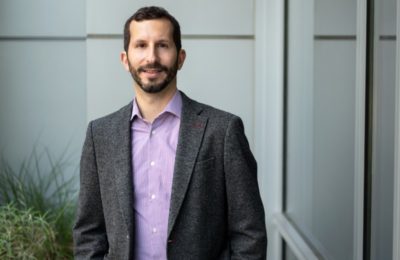di Laura D'Ettole

Michael Alexanian, PhD
Michael Alexanian was born in Florence in 1985, but already as a child he had his head in science and in the world. In elementary school, in 1993, he watches and watches the film "Jurassic Park" five times and together with other schoolmates, subsequently, tries to bring back to life a fly trapped in a piece of amber. Obviously he won't, but today Michael is an Assistant Professor in the Department of Pediatrics at the University of California-San Francisco, and a Research Fellow at the Gladstone Institute for Heart Disease, discovering new frontiers for treating and undoing heart failure. . How? Digging into the world of the infinitely small of DNA thanks to his specialization in epigenetics, a branch of genetics that studies the modifications made by the environment (eg smoke, pollution, etc.) on the regulation of the genes of our DNA. “My interest in epigenomics began when I was a university student at the University of Florence”. Michael still remembers the first chapter of the book he read on gene regulation. Illuminating as the fly in the amber of "Jurassic Park", the film that millions of us have watched with almost childish eyes without getting anything out of it, unlike Michael.
In 2021 Alexanian, combining his interest in epigenomics with heart disorders, together with colleagues at the Gladstone Institute made a revolutionary discovery: the MEOX1 gene, responsible together with other genes, for cardiac fibrosis. Now, Alexanian plans to continue the work with animal studies, showing how fibrosis of the heart and other organs could be prevented or treated.
“The healthy human heart is a powerful, flexible organ that expands and contracts rapidly to pump oxygen-rich blood around the body,” he explains. But for millions of people around the world who suffer from heart disease, something is wrong with this process. The heart stiffens, stops, becomes inflamed and is less efficient at pumping blood. “We want to discover new drugs to control and eliminate heart failure,” Alexanian says.
For a long time, science has focused attention on cardiomyocytes (heart cells, which contract and release continuously) as responsible for heart failure. In my lab I want to focus instead on other cells, especially the "fibroblasts" (cells that could be responsible for fibrosis. Alexanian has already discovered the genes involved in fibrosis and inflammation.
The focus of Michael's future research is also to understand how genes are switched on or off in the hearts of people with heart disease, and how new therapies can undo these abnormalities to improve heart function. His findings are highly promising.
At the Gladstone Institute, an independent, non-profit research organization that has an academic ties to the University of California, San Francisco, Alexanian has found a very inspiring place for her research and has put down roots there. But for years he wandered the world. After his BA and MA in Florence, he spent several months at the Walter and Eliza Hall Institute in Melbourne, Australia, working with epigenomics pioneer Marnie Blewitt. Armed with enthusiasm, he returns to Europe and pursues a postgraduate degree in stem cell biology at the University of Lausanne in Switzerland. He joins the lab of cardiovascular researcher Thierry Pedrazzini, to carry out studies on how genes are regulated in stem cells. There he is captivated by the heart. His curiosity takes him from one laboratory to another all over the world and he tries to devote himself to research to apply his creative thinking. In fact, he argues that biology often has aspects of storytelling that attract him and for him creativity is part of life. A longtime drummer and theater enthusiast, he joined an improvisational theater group during his undergraduate degree in Lausanne. ''I really fell in love with improvisation'' he declares. "There's a lot of preparatory technique that isn't appreciated behind the scene, but obviously there's also this creative aspect on stage." In San Francisco, Alexanian, unable to find a similar group, creates his own to teach improvisation to men of science and find an outlet for his scientific creativity. He says that team spirit and deep knowledge of both epigenomes and cardiovascular science meant that this was the right place to found his laboratory. ''The most effective way to engage in science is to interact with the environment and with the specialists around you. Gladstone makes it really simple''.
Michael Alexanian, PhD, is a research assistant at the Gladstone Institute and assistant professor of pediatrics at the University of California, San Francisco.
The article is taken from “Revealing Molecular Variations in Heart Disease” by Sarah CP Williams, translated by Simona Geninazza.
